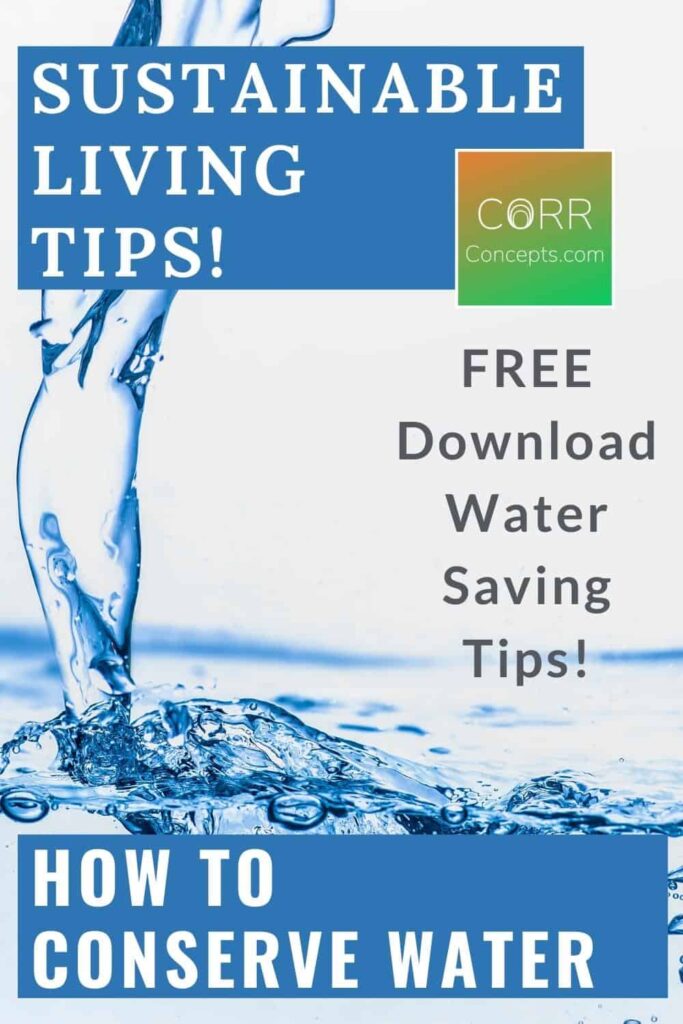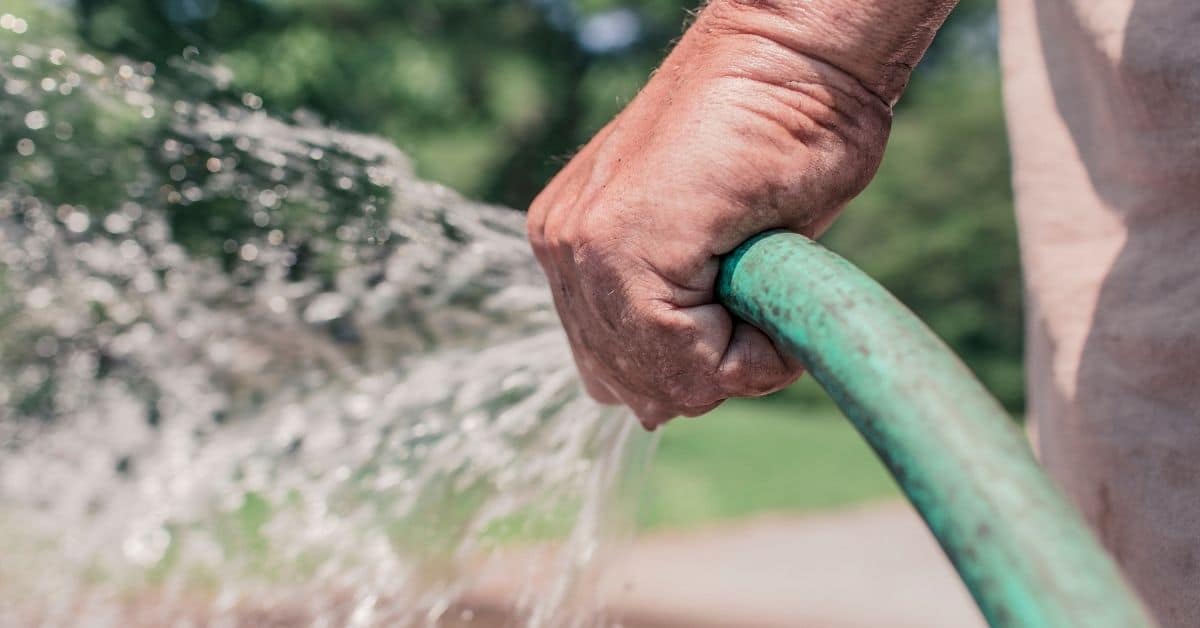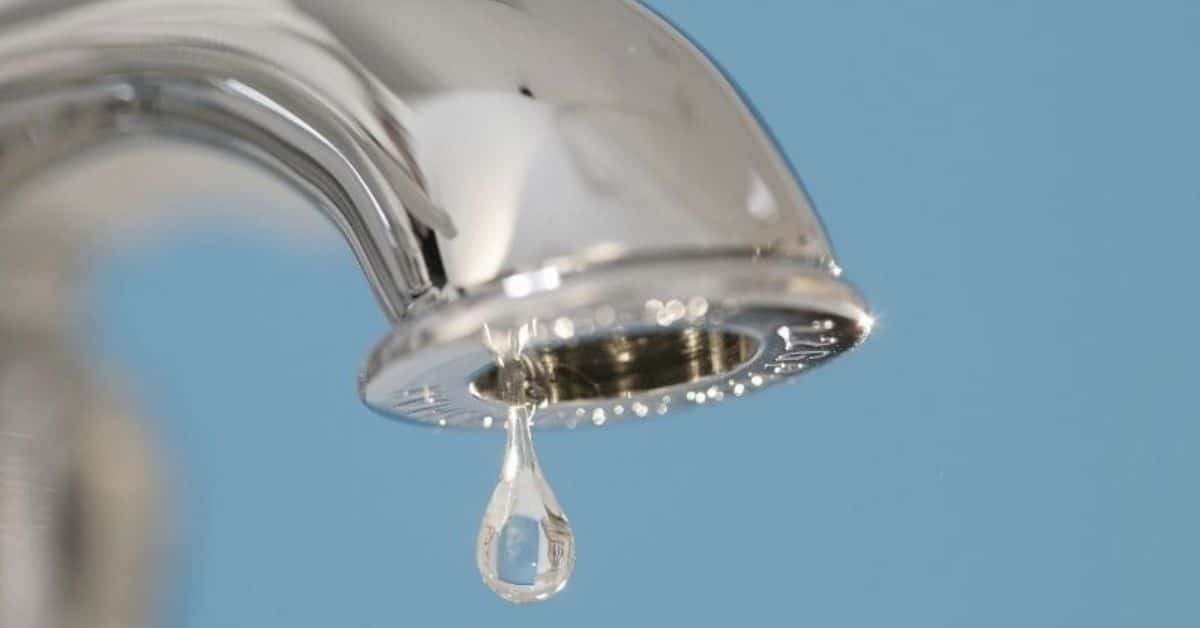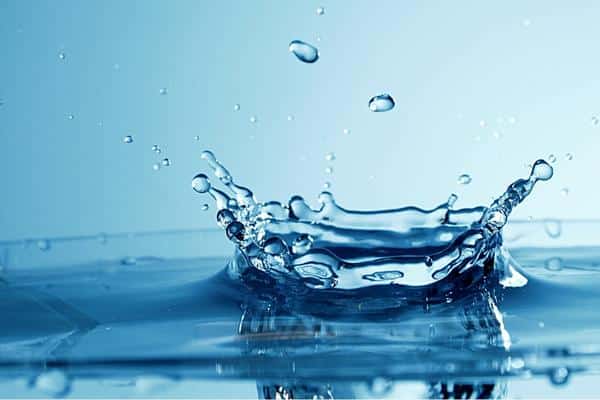
HOW TO CONSERVE WATER
Learn about the intent to conserve water for water sustainability, why it is important, and find actionable water and money-saving tips to reduce your eco and carbon footprints.
This site contains affiliate links for your convenience. The goal is to first provide links to eco-friendly, ethical, and sustainable brands, and then to those same type brands that use Amazon (i.e., Climate Pledge Friendly Certification), if possible. Therefore, you may see multiple links for one option. Should you make a purchase through any link, I will receive a small commission at no additional cost to you. See my Disclaimers & Disclosures and Privacy Policy for more information.
Like this? Share it with others!
Learn the “What”, “Why”, and, more importantly, “How to” conserve water with a FREE DOWNLOADABLE BELOW to get you started saving water and money everyday.
What Does it Mean to Conserve Water?
When we talk about water conservation, we ultimately want to achieve “sustainable water.” Simply put, this means using water wisely to assure a sufficient supply of fresh water to meet the needs of people and nature, while further guaranteeing supply for future generations.
Developed countries have modern irrigation and utility water systems to provide water for drinking, plumbing, and food production and preparation. Unfortunately, not many in industrialized, developed countries don’t know how safe, or unsafe, that water is to consume.
Many undeveloped countries’ populations do not have proper access to water at all. An estimated 880 million people do not have access to safe drinking water and 2.7 billion people do not have adequate sanitation.
Therefore, sustainable water needs to ensure there is a sustainable and clean supply of water above and below ground to meet the following needs:
- human health and sanitation,
- drinking water,
- healthy food production and preparation, and
- wildlife and ecosystems.
The good news is that there are ways you can help now. You can individually implement methods of reducing your water usage through your daily actions and through products you use.
Little to big methods of change implemented individually can culminate to major, positive results towards reducing negative impacts on our environment.
Why is Water Conservation Important?
Conserving water is important because fresh water is a finite resource, and we cannot live without fresh water. As the graph below indicates, 97.5% of Earth’s water is saltwater while only 2.5% is fresh water with less than 1% of that fresh water existing in our lakes, rivers and streams.
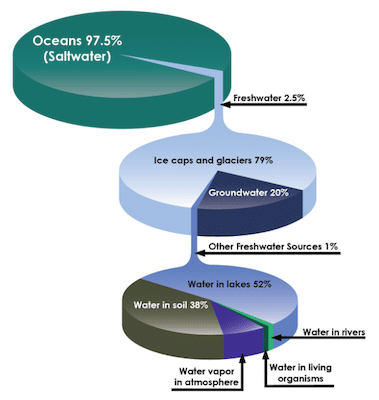
Fresh water is also a renewable resource; however, much of it is lost in the natural water cycle (see image below) with particulates being picked up in the air and ground.
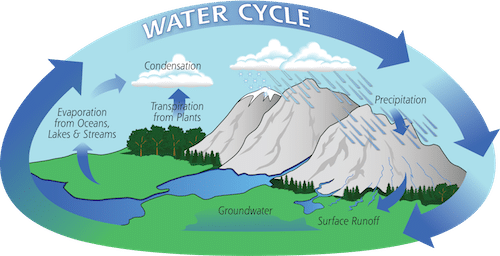
Additionally, poor fresh water policies and use have caused water tables to sink and aquifers to be depleted. The Nestle Corporation is famous for going into local areas around the globe for extracting water for bottled water and depleting water tables so low that local communities can no longer support themselves. Many communities and organizations, like Story for Stuff, are having to fight back.
Aquifers provide “fossil water” – water that has taken millions of years to collect below ground. Like fossil fuels, fossil water cannot be replenished our lifetime. The most important of these aquifers in the U.S. is the Ogallala Aquifer that spans across eight states in the midwest and is responsible for 30% of our country’s crop irrigation.
In fact, a Kansas State University study in 2013 demonstrated we are depleting this aquifer so quickly, there is fear it could run out in 50 years. If this aquifer depletes, experts state it would take 6,000 years to replenish. How would it impact our health and economy if we run out of this water?
When We Don’t Conserve Water: The Effects
How about 4 million people in Cape Town, South Africa facing running out of water in 2018? Or reports that 100 million people in India will be without groundwater by 2020? Or that Chennai, India is already without water and millions are forced to live off of trucked-in water? How expensive – mentally, physically and financially – or sustainable is this?
It’s also not just a matter of running out of water. How about available water that is too toxic to drink, like in Flint, Michigan? Since 2014, 12 people died and dozens more afflicted. However, what are the lasting costs?
As the human population grows, it is imperative we have a system of water governance in place everywhere to ensure we do not run out of fresh water. Water is the #1 commodity consumed worldwide. Water is also one thing we cannot live without.
When the environment is negatively impacted, these effects are reflected on our society and economy. It’s a viscous cycle that will not end until we reduce our use of water and build better water governance systems to conserve and protect it for sustainable water ways, ground water and aquifers. Benefits would also include lowered water costs for users and providers.
How To Conserve Water
Water Conservation – Behavior Changes
Changing your daily water use habits is the other component to reducing your water consumption. These habit changes can be done in different levels.
Go ahead and get started by downloading my Water Conservation Checklist for FREE. This checklist will take you through Level 1 (easy and least expensive) to Level 3 (advanced and more upfront costs) steps to save water indoors and outdoors.
All level steps will provide you a return on your financial investment no matter which steps you choose to take.
If you want more tips and ideas, check out the Water Conservation blog posts that are continually added for your convenience.
Download and Get Started…
Get water conservation tips at your fingertips. Download your Water Conservation Checklist for FREE. I encourage you to review these tips, pick some to use, and take the Water Conservation Challenge below.
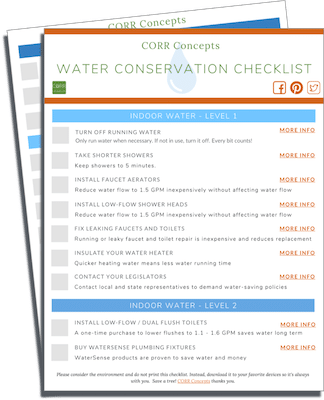
Water Conservation – Conscious Consumerism
CORR Concepts is doing the home work for you to take the guesswork out of water conservation products. Click the button below to be taken to the water product third-party certifier list and ever-growing list of water conservation products you can use to lower your eco and carbon footprints.
Take the Water Conservation Challenge
Go a step further and take the CORR Concepts “Water Conservation Challenge” by doing the following:
1. Take the pledge to turn off the water when you’re not actively using it. Get others to take the pledge.
2. Pick at least one more of the Water Conservation Initiatives and implement them into your everyday life. Periodically, go back to remeasure your Ecological and/or Carbon Footprint to see if you’ve lowered your score. Keep adding more Water Conservation tips to your daily life to keep reducing your footprint(s).
3. Share this webpage to at least one person so that the sustainability message will spread and enrich and benefit us all.

